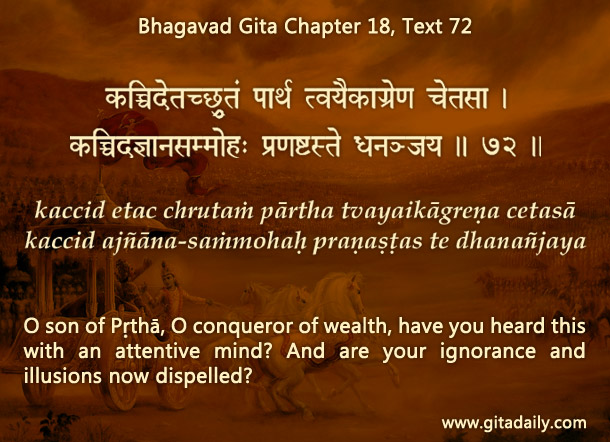Our culture often bombards us with explicit images of what is considered to be love. If we equate love with such gushy expressions alone, we will miss out on love’s many subtler expressions.
For example, if parents come from a culture conservative about public displays of affection, their love for their children may not be seen in any effusive displays or declarations of love. But it will be evident in their working diligently to provide their kids’ high-quality education. Similarly, a teacher may express affection for students not by any dramatic or melodramatic expressions but by spending extra time helping them understand a difficult subject.
Krishna exhibits such subtle affection for Arjuna towards the end of the Bhagavad-gita. Of course, the whole Gita is spoken by Krishna out of affectionate concern for his dear friend. He wants to help Arjuna come out of the paralyzing delusion that had afflicted him on seeing his relatives assembled, bellicose, on the Kurukshetra battlefield. Still, despite the Gita’s affectionate intent, its content can be intellectually demanding, discussing as it does various levels of dharma and their complex inter-relationships. The cognitive challenge of processing the Gita’s multi-level message can make us blind to the love that underlies and unifies it.
Thankfully, Gita commentators provide us with the eyes of knowledge to appreciate this thread of love. The last verse Krishna speaks (18.72) is an enquiry: Has Arjuna’s illusion been dispelled? The erudite commentator Srila Vishvanath elucidates the loving concern that animates Krishna’s enquiry: If Arjuna has not understood any part of the Gita, Krishna is ready to repeat that part – he is ready to repeat even the whole Gita if necessary.
Thus, with the eyes of knowledge, we can appreciate how the message that began with love and centered on love concludes in love.
To know more about this verse, please click on the image
Explanation of article:
Podcast:


Deeply touched. Most grateful to you for attracting us to spend time with God’s Music
sishaavaasyo idam sarvam
Good